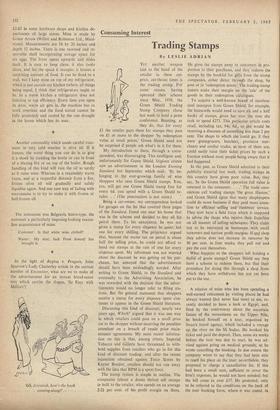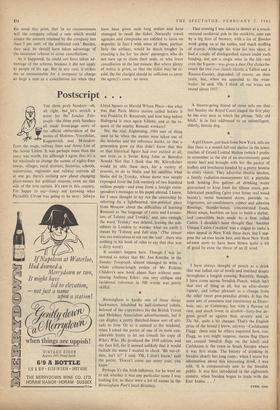Consuming Interest
Trading Stamps
By LESLIE ADRIAN YET another weapon laid to the hand of the retailer in these cut- price, cut-throat times is the trading stamp. For some reason, having operated their scheme since May, 1958, the Green Shield Trading Stamp Company chose last week to hold a press conference. Boasting, as they do, that for every the retailer pays them for stamps they pass on £1 or more to the shopper `by redemption value at retail prices,' Green Shield need not be surprised if people ask what's in it for them.
My Introduction to them, through a corre- spondent, was discouraging. This intelligent and, unfortunately for Green Shield, litigious citizen saw an advertisement in the London Evening Standard last September which said: 'By be- longing to the ever-growing family of wise Shoppers who save Green Shield stamps. You, too, will get one Green Shield stamp free for every 6d. you spend with a Green Shield re- tailer. . (The punctuation is not mine.) Being a car-owner, my correspondent looked for garages on the list that covered three pages of the Standard, found one, near his home that was in the scheme and decided to, buy all his petrol there. To his annoyance, he was not given a stamp for every sixpence he spent; but one for every shilling. The proprietor argued that, because the excise tax on petrol is about half the selling price, he could not afford to hand out stamps at the rate of one for every sixpence spent. My informant was not worried about the discount he was getting on his pur- chases, but annoyed that the advertisement should have been misleadingly worded. After writing to Green Shield, to the Standard and eventually to the Advertising Association, he was rewarded with the decision that the adver- tisements would no longer refer to filling sta- tions. But the general statement that shoppers. receive a stamp for every sixpence spent con- tinues to appear in the Green Shield literature.
Discussing this kind of discount, nearly two years ago, Which? argued that it was one way in which retailers could pass on a small price cut to the shopper without incurring the penalties attendant on a breach of resale price main- tenance agreements. My most recent informa- tion on this is that, among others, Imperial Tobacco and Gillette have threatened to with- hold supplies from retailers who go in for this kind of discount trading; and after the recent injunction obtained against ..Tesco Stores by Kayser Bondor, retailers should not run away with the idea that RPM is a spent force.
The stamp system is simple in outline. The companies (about a dozen thrive) sell stamps in bulk to the retailer, who spends on an average 2-2+ per cent. of his profit margin on them. He gives the stamps away to customers in pro- Portion to their purchases, and they 'redeem the stamps by the bookful for gifts from the stamp companies, either direct through the shop, by post or in 'redemption stores.' The trading-stamp issuers make their margin on the 'sale' of the goods in their redemption catalogues.
To acquire a well-known brand of stainless- steel saucepan from Green Shield, for example, the housewife would need to save six and a half books of stamps, given her over the time she took to spend £273. This particular article costs retail, including tax, 94s. 6d., so she, would be receiving a discount of sometbing less than 2 per cent. The shops to which she 'could go, if they were' greengrocers, butchers, provision mer- chants and similar trades, as most of them are, could easily raise their ticket prices by such a fraction without most people being aware that it had happened.
In the past, as Green Shield admitted in their publicity material last week, trading stamps in this country have given poor value. But, they say, 'In the Green Shield operation full value is returned to the consumer. . . .' The trade asso- ciations call trading stamps 'the great illusion,' and Green Shield agree that many shopkeepers could do more business if they paid more atten- tion to efficient - selling and custOmer service. They now have a field force which is supposed to advise the shops who receive their franchise on all manner of selling techniques. They claim not to be interested in businesses with small turnovers and narrow profit margins. If any shop they advise does not increase its turnover by 30 per cent. in four weeks, they pull out and pay the cost themselves.
What happens to the shoppers left holding a fistful of green stamps? Green Shield say they have a scheme to redeem them, but that their procedure for doing this through a shop from which they have withdrawn has not yet been put to the test.
A relative of mine who has been spending a well-earned retirement by visiting places he had always wanted (but never had time) to see, re- cently decided to have a look at Egypt; and, fired by the controversy about the uncertain future of the monuments on the Upper Nile, he booked himself on a tour, organised by Swan's travel agency, which included a voyage up the river on the SS Sudan. He booked his ticket and paid the deposit. Then, some six weeks before the tour was due to start, he was ad- vised against going on medical grounds; so he wrote cancelling the booking. In due course the company wrote to say that they had been able to resell his place on the tour; nevertheless, they proposed to charge a cancellation fee. If this had been a small sum, sufficient to cover the firm's expenses, he would not have minded; but the bill came to, over £17. He protested; only to be referred to the conditions on the back of the tour booking form, where it was stated, in the usual tiny print, that 'in no circumstances will the company refund a sum which would render the amount retained by the company less than 5 per cent. of the estimated cost.' Besides, they said, he should have taken advantage of the insurance scheme to cover cancellations.
As it happened, he could not have taken ad- vantage of the scheme, because it did not apply to people of his age. But in any case, it strikes me as unreasonable for a company to charge so large a sum as a cancellation fee when they have been giyen such long notice and have Managed to resell the ticket. Naturally travel agencies and companies are entitled to insist on deposits; in fact I wish some of them, particu- larly the airlines, would be much tougher in exacting a fee for `no show' passengers who do not turn up to claim their seats, or who leave cancellation to the last minute. But where plenty of notice is given, so that the ticket may be re- sold, the fee charged should be sufficient to cover the agency's costs : no more.



































 Previous page
Previous page